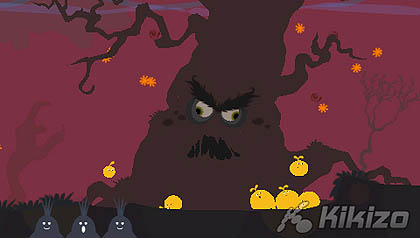LocoRoco 2
Enemies of the yellow, tuneful and squishy, look away now: LocoRoco's back, but can it revolutionise 2D platforming a second time?
| Version PSP | Developer SCE | Publisher SCE | Genre Action |
||||
Page: 1 2
Page 2
The environments themselves (40 in total) make little effort to shirk convention, refiguring those conventions rather in clean, textureless pastel colours. There are snowy levels stocked with icy slopes and loop-the-loops, jungle temples with an abundance of pressure panels and Aztec staircases, pastoral spots whose huge, bobbing flowers serve as precarious walkways, and industrial zones that are all smouldering orange haze and purple girder.
LocoRoco 2 brazenly recycles some of the original's best material - you'll spend an enjoyable half-an-hour rolling around the innards of a colossal penguin - but there's greater range and, perhaps, subtlety to the challenges. Most of these hinge on changing the physical properties of the LocoRoco, rubberising the blighters to make them excessively bouncy, or wedging them inside a huge stone afro (we kid you not) to bust through a pile of boulders.
Nevertheless, for every fresh complication there's a familiar face, like the living pillars who launch you skyward with a baritone yell, or the owl creatures who gobble LocoRoco up and spit them out a different shape. Visually the two games are almost identical, much to our relief - it's hard to imagine how Sony could have built on the original's distinctive lo-fi aesthetic without compromising it. The 2D scaling is once again seamless, and those animated backdrops, beset with flying petals and streams of multi-coloured wind, still draw covetous eyes on packed tube trains (and those ten-minute-long levels are perfect fodder for the commute). There are new tunes, each cuddlier than the last and all equally liable to lodge in your forebrain, plus some remastered contributions from the first game's soundtrack.
If it dances to the same beat, LocoRoco 2 has more structure than its forebear: levels can be "upgraded" by grabbing enough stuff within them, making it easier to find bugs on subsequent playthroughs, and the world map has been divided into different districts containing two or three levels apiece, with the player flitting backwards and forwards between districts as the story mode unfolds. It's all a bit smoke-and-mirrors, ultimately, but there's at least the sense of greater depth to compliment the well-worn emphasis on nailing the shortest level times, finding all the hidden areas and gathering all the collectables.
There are more mini-games, too, but none of them will keep you plugging away for long. By far the more ample is the Mui Mui house, with a good few dozen chambers and trinkets to carve out and bodge together for your residents. It's by no means a true sim-management mode, though - you can only place rooms and objects where the game wants you to - and is a disappointing step back from the first game's Loco House and Editor, which actually let you construct your own level from components garnered in the main game. Elsewhere, a spot of rail shooting, whack-a-mole rip-off and the option to bet on LocoRoco races charm briefly but fail to hold the attention.
LocoRoco remains one of the most original titles this generation and a key one for its platform, eking every last ounce of charisma out of that beautiful screen while evading the control issues that bog down the bulk of the PSP's line-up. The sequel does little more than surf that momentum, and much as we love our singing jellybaby heads it's easy to feel crestfallen. Wave away the cloud of familiarity which hovers Moja-like over the proceedings, however, and turn a kindly eye to some of the more blatant instances of padding, and it's as necessary an experience as it ever was.
| ||||||||||||
|
Page: 1 2













 Satoru Iwata Video Interview - the late Nintendo president spoke with Kikizo in 2004 as 'Nintendo Revolution' loomed.
Satoru Iwata Video Interview - the late Nintendo president spoke with Kikizo in 2004 as 'Nintendo Revolution' loomed. Kaz Hirai Video Interview - the first of Kikizo's interviews with the man who went on to become global head of Sony.
Kaz Hirai Video Interview - the first of Kikizo's interviews with the man who went on to become global head of Sony. Ed Fries Video Interview - one of Xbox's founders discusses an epic journey from Excel to Xbox.
Ed Fries Video Interview - one of Xbox's founders discusses an epic journey from Excel to Xbox. Yu Suzuki, the Kikizo Interview - we spend time with one of gaming's most revered creators.
Yu Suzuki, the Kikizo Interview - we spend time with one of gaming's most revered creators. Tetris - The Making of an Icon: Alexey Pajitnov and Henk Rogers reveal the fascinating story behind Tetris
Tetris - The Making of an Icon: Alexey Pajitnov and Henk Rogers reveal the fascinating story behind Tetris Rare founders, Chris and Tim Stamper - their only interview? Genuinely 'rare' sit down with founders of the legendary studio.
Rare founders, Chris and Tim Stamper - their only interview? Genuinely 'rare' sit down with founders of the legendary studio. The History of First-Person Shooters - a retrospective, from Maze War to Modern Warfare
The History of First-Person Shooters - a retrospective, from Maze War to Modern Warfare